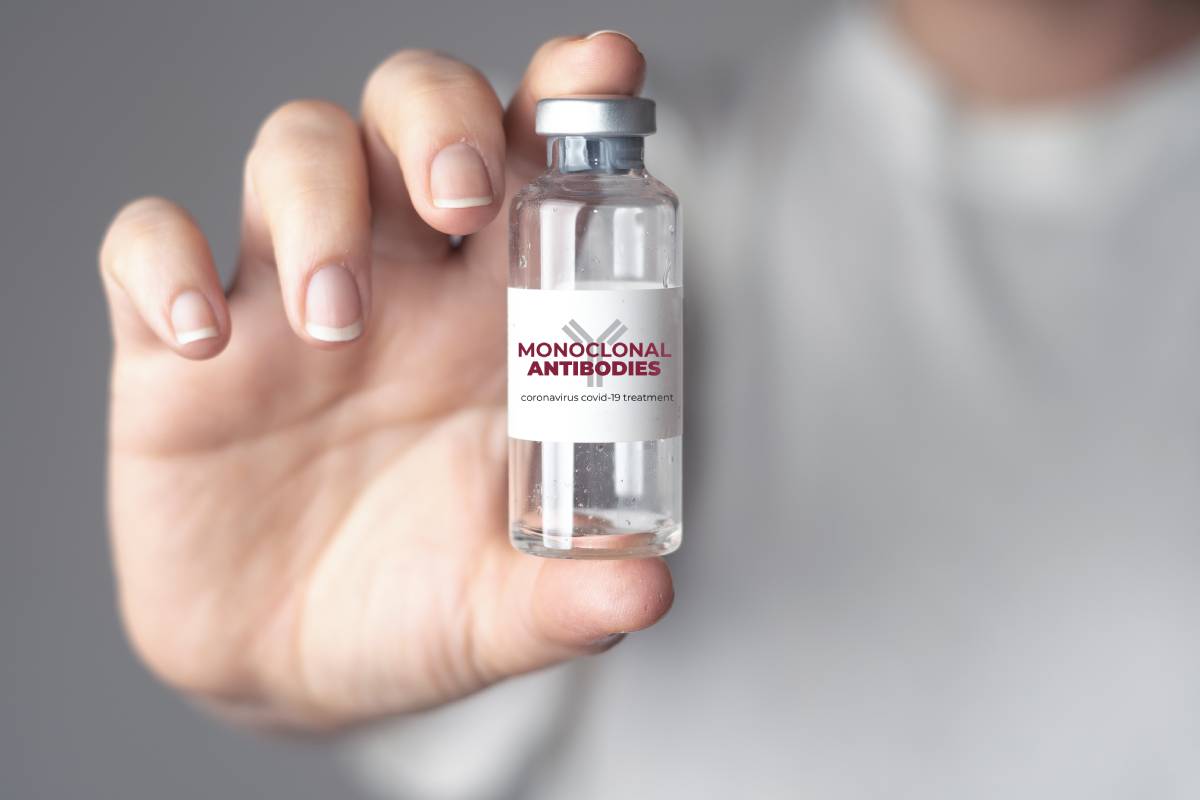Monoclonal Antibody Therapy Beyond Covid

Monoclonal antibody therapy has been used as an effective treatment for preventing severe disease in high-risk patients during the COVID-19 pandemic. Developed in laboratories, these manufactured antibodies are created by cloning a singular B cell, resulting in identical antibodies that bind to a specific epitope (part of an antigen that can stimulate an immune response). The popular use of monoclonal antibody therapy in medicine, both for COVID-19 and beyond, stems from their reproducibility and highly specific affinities for binding sites (Quinteros).
Unlike vaccines, monoclonal antibody therapy has the immediate effect of providing antibodies to fight off the COVID-19 virus, since building natural immunity through vaccination can take several weeks. Consequently, monoclonal antibodies have been used as post-exposure prophylaxis in high-risk patients who are either not fully vaccinated or expected to mount an inadequate immune response, typically within 7 days of symptom onset (“Coronavirus Update”). They are not intended to be an alternative to vaccines, but rather, an additional tool to prevent hospitalization and death in immunocompromised individuals (Combat Covid).
Throughout the COVID-19 pandemic, various monoclonal antibody treatments received Emergency Use Authorizations (EUAs) from the FDA, notably, bamlanivimab plus estesevimab (administered together), casirivimab plus imdevimab, and bebtelovimab. A side effect of monoclonal antibody therapy can be a reduction in the body’s immune response to other COVID-19 variants or future infections (Cavazzoni). Considering this risk, in January 2022, the FDA modified the authorizations for bamlanivimab/estevimab and casirivimab/imdevimab, instructing clinicians to only administer these treatments for variants that were susceptible to these particular antibodies, which had been shown to be ineffective against the Omicron variant (Cavazzoni). Less than a month later, an EUA for bebtelovimab, a monoclonal antibody therapy that is effective against the Omicron variant, was issued (“Coronavirus Update”).
However, even prior to the pandemic, monoclonal antibodies had been taking up an expanding portion of the biopharmaceutical market, overtaking recombinant proteins as the leader in sales in 2017 (Tsumoto). They have been used in diagnostic contexts, such as analyzing bodily fluids, ascertaining pregnancy, and evaluating for heart attacks, as well as ensuring safe blood transfusion and organ transplantations (Quinteros).
Diseases that can be treated with monoclonal antibody therapy include asthma, multiple sclerosis, autoimmune disorders, rheumatoid arthritis, and a number of cancers (Tsumoto). Monoclonal antibodies are a particularly useful tool in fighting cancer because of their dual functions of killing tumor cells and eliciting an immune response against tumors, potentially offering a more effective and safer alternative to chemotherapy (Zahavi). For instance, monoclonal antibodies can induce apoptosis in tumor cells by binding to growth factor receptors and preventing growth factor receptor signaling between cells (Zahavi). Antibody-drug conjugates (ADCs), formed by a monoclonal antibody bound to a cytotoxic drug, can deliver the drug to a tumor that expresses the epitope for which the monoclonal antibody has an affinity. When first administered, the drug may be in an inactive form and subsequently activates after binding to and being internalized by the cancerous cell (Quinteros).
Previous research has demonstrated that monoclonal antibodies recognize two types of epitopes: a linear type and a 3-D, conformational type that varies according to the secondary and tertiary structures of proteins (Tsumoto). Current monoclonal antibodies have a higher specificity for the former type; consequently, producing more monoclonal antibodies with high specificity for conformational epitopes may result in even more selectivity and effectiveness in monoclonal antibody therapy (Tsumoto). Additional research in the realm of monoclonal antibody therapy may result in safer and more effective treatments for many of the major diseases beyond COVID-19 that modern medicine continues to grapple with.
References
Cavazzoni, Patrizia.“Coronavirus (COVID-19) Update: FDA Limits Use of Certain Monoclonal Antibodies to Treat COVID-19 Due to the Omicron Variant.” U.S. Food and Drug Administration, https://www.fda.gov/news-events/press-announcements/coronavirus-covid-19-update-fda-limits-use-certain-monoclonal-antibodies-treat-covid-19-due-omicron.
“Coronavirus (COVID-19) Update: FDA Authorizes New Monoclonal Antibody for Treatment of COVID-19 that Retains Activity Against Omicron Variant.” U.S. Food & Drug Administration, https://www.fda.gov/news-events/press-announcements/coronavirus-covid-19-update-fda-authorizes-new-monoclonal-antibody-treatment-covid-19-retains.
Quinteros, Daniela et al. “Therapeutic Use of Monoclonal Antibodies: General Aspects and Challenges for Drug Delivery.” Nanostructures for Drug Delivery, 2017, pp. 807-833. PubMed, doi: 10.1016/B978-0-323-46143-6.00025-7
Tsumoto, Kanta et al. “Future perspectives of therapeutic monoclonal antibodies.” Immunotherapy vol. 11,2 (2019): 119-127. doi:10.2217/imt-2018-0130
“What Are Monoclonal Antibodies?” Combat Covid, U.S. Department of Health and Human Services, https://combatcovid.hhs.gov/what-are-monoclonal-antibodies.
Zahavi, David, and Louis Weiner. “Monoclonal Antibodies in Cancer Therapy.” Antibodies (Basel, Switzerland) vol. 9,3 34. 20 Jul. 2020, doi:10.3390/antib9030034
